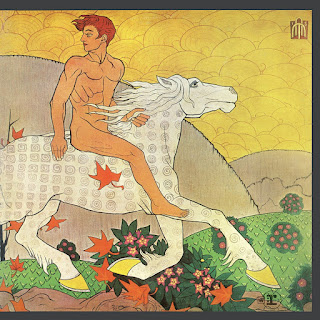Then Play On is the third studio album by the British blues rock band Fleetwood Mac, released on 19 September 1969. It was the first of their original albums to feature Danny Kirwan (although two tracks recorded with him were included on the compilation album The Pious Bird of Good Omen released earlier in 1969) and the last with Peter Green. Although still an official band member at the time, Jeremy Spencer did not feature on the album apart from "a couple of piano things" (according to Mick Fleetwood in Q magazine in 1990). The album offered a broader stylistic range than the straightforward electric blues of the group's first two albums, displaying elements of folk rock, hard rock, art rock and psychedelia. The album reached No. 6 on the UK Albums Chart, becoming the band's fourth Top 20 LP in a row, as well as their third album to reach the Top 10. The album's title, Then Play On, is taken from the opening line of William Shakespeare's play Twelfth Night—"If music be the food of love, play on".
Then Play On is Fleetwood Mac's first release with Reprise Records after being lured away from Blue Horizon and a one-off single with Immediate Records. The label would be the band's home until their self-titled 1975 album, after which they signed to Reprise's parent company Warner Records. The initial US release of the album omitted two tracks that were previously issued on the American compilation album English Rose, while the second US pressing further abridged the tracklist with the addition of the hit single "Oh Well". The original CD compiled all the songs from the two US LP versions, both of which omitted the English Rose tracks that are on the original UK version. In August 2013, a remastered edition of the album was reissued on vinyl and CD. This version includes all the tracks from all previous versions of the album, with the original 1969 UK track listing as the main album and both parts of "Oh Well", as well as the 1970 non-album single "The Green Manalishi (With the Two-Pronged Crown)" and its B-side "World in Harmony", as bonus tracks.
Fleetwood Mac's previous albums had been recorded live in the studio and adhered strictly to the blues formula. For the recording of Then Play On, editing and overdubbing techniques were used extensively for the first time. Green had recently introduced improvisation and jamming to the band's live performances and three of the tracks on the album including "Underway", "Searching for Madge", and "Fighting for Madge", which were compiled by Green from several hours of studio jam sessions.
Green, the de facto band leader at the time, delegated half of the songwriting to bandmate Danny Kirwan. Music journalist Anthony Bozza remarked that Green “was a very generous band leader in every single way. And Peter gave Danny all of that freedom. You just don’t hear about things like that.” Jeremy Spencer, the band's other guitarist, did not play on any of the album's original tracks. Green and Spencer had planned to record a concept album — “an orchestral-choral LP” — about the life of Jesus Christ, although the album never came to fruition. Instead, Spencer released a solo album in 1970 with the members of Fleetwood Mac as his backing band. In the US, "One Sunny Day" and "Without You" were not included on the album, as they had already been included on the US compilation album English Rose in December 1968.
Then Play On was quickly followed by the non-album single "Oh Well", which reached No. 2 in the UK Singles Chart. "Oh Well" was not initially released as a single in the US, as the band's then-manager Clifford Davis felt album track "Rattlesnake Shake" would be a better choice for US single release. Davis expected that "Rattlesnake Shake" would be commercially successful, but it failed to chart. After the failure of "Rattlesnake Shake", "Oh Well" was chosen as the next single for the US market. "Oh Well" fared much better, becoming the band's first song to chart on the Billboard Hot 100. In January 1970, Then Play On was reissued in the US , this time with "Oh Well" in place of "When You Say" and "My Dream". The first CD issue of the album in the 1980s included every track from both the 1969 and 1970 US versions of the album. The 2013 remastered CD has the original UK album as tracks 1 to 14 with parts 1 and 2 of "Oh Well", the 1970 non-album single "The Green Manalishi (With the Two-Pronged Crown)" and its B-side "World in Harmony" as tracks 15 to 18.
The painting used for the album cover artwork is a mural by the English artist Maxwell Armfield. The painting was featured in the February 1917 edition of The Countryside magazine, which noted that the mural was originally designed for the dining room of a London mansion.
Track listing
- "Coming Your Way" Danny Kirwan Kirwan 3:47
- "Closing My Eyes" Peter Green Green 4:50
- "Fighting for Madge" Mick Fleetwood Instrumental 2:45
- "When You Say" Kirwan Kirwan 4:22
- "Show-Biz Blues" Green Green 3:50
- "Underway" Green Instrumental 3:06
- "One Sunny Day" Kirwan Kirwan 3:12
- "Although the Sun Is Shining" Kirwan Kirwan 2:31
- "Rattlesnake Shake" Green Green 3:32
- "Without You" Kirwan Kirwan 4:34
- "Searching for Madge" John McVie Instrumental 6:56
- "My Dream" Kirwan Instrumental 3:30
- "Like Crying" Kirwan Kirwan, Green 2:21
- "Before the Beginning" Green Green 3:28
2013 remaster bonus tracks
- "Oh Well - Pt. 1" Green Green 3:22
- "Oh Well - Pt. 2" Green Instrumental 5:39
- "The Green Manalishi (With the Two-Pronged Crown)" Green Green 4:37
- "World in Harmony" Kirwan, Green Instrumental 3:26
Fleetwood Mac – producers
Martin Birch – engineer
Dinky Dawson – sound consultant














No hay comentarios.:
Publicar un comentario